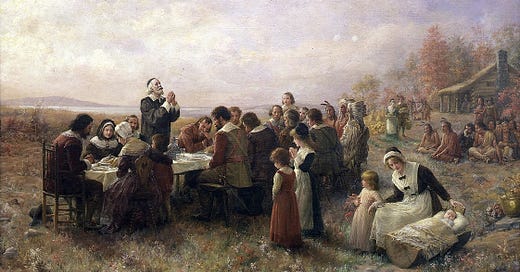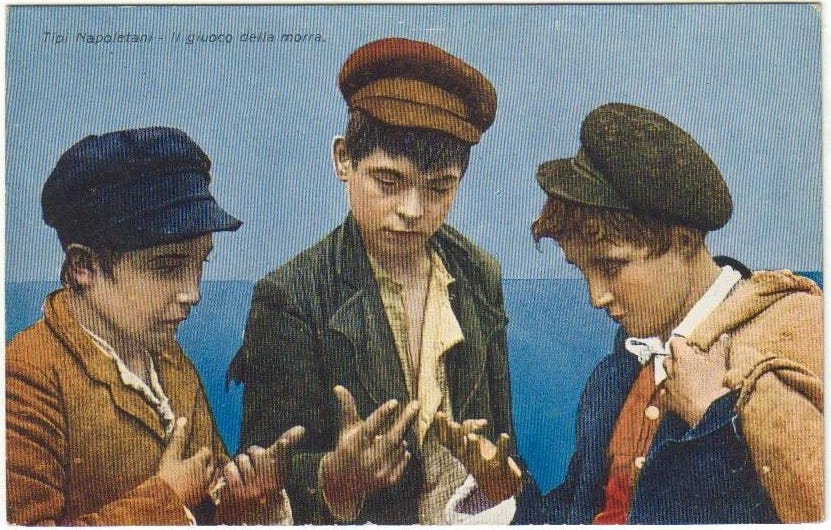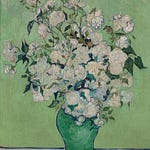On a day in 1621, in the first autumn after the pilgrim fathers landed on the shores of Massachusetts, the settlers were going to have a feast with turkeys they had shot, and some of the corn (maize; we in America first called it Indian corn and then just corn, for short) they had raised, when they were unexpectedly visited by the friendly sachem Massasoit and quite a few of his people, who brought with them plenty of venison, and that, it is considered, was the first thanksgiving, our Word of the Week. They had reason to be grateful to Massasoit and to his friend Squanto, who could speak English, and who showed them how to use fish to fertilize the land for growing that corn.
But the first official Day of Thanksgiving that we hear about from William Bradford, the governor of the small colony, was celebrated a little later, in 1623. I’ll let Bradford describe it in his own words:
I may not here omit how, notwithstanding all their great pains and industry, and the great hopes of a large crop, the Lord seemed to blast and take away the same, and to threaten further and more sore famine unto them, by a great drought which continued from the third week in May till about the middle of July, without any rain, and with great heat (for the most part), insomuch as the corn began to wither away, though it was set with fish, the moisture whereof helped it much. Yet at length it began to languish sore, and some of the drier grounds were parched like withered hay, part whereof was never recovered. Upon which they set apart a solemn day of humiliation, to seek the Lord by humble and fervent prayer, in this great distress. And he was pleased to give them a gracious and speedy answer, both to their own and the Indians’ admiration that lived amongst them. For all the morning, and greatest part of the day, it was clear weather and very hot, and not a cloud or any sign of rain to be seen, yet toward evening it began to overcast, and shortly after to rain, with such sweet and gentle showers as gave them cause of rejoicing and blessing God. It came, without either wind, or thunder, or any violence, and by degrees in that abundance, as that the earth was thoroughly wet and soaked therewith. Which did so apparently revive and quicken the decayed corn and other fruits, as was wonderful to see, and made the Indians astonished to behold; and afterwards the Lord sent them such seasonable showers, with interchange of fair warm weather, as, through his blessing, caused a fruitful and liberal harvest, to their no small comfort and rejoicing. For which mercy (in time convenient) they also set apart a day of thanksgiving.
So then, it appears that a day of humbling came before the day of thanksgiving for a good crop, and there’s a fitness to that, because to humble yourself, in the inner sense of the word (Latin humus, soil), is to lower yourself to the earth, the soil beneath your feet. “My soul cleaves to the dust,” says the Psalmist. The pilgrims don’t seem to have been an unruly and rebellious lot, though you can’t say that about some of the shipmen who brought them to America, nor of the promise-breaking and trouble-making Thomas Weston, one of the principal merchants who financed the Mayflower. Weston and his men were thorns in the sides of both Massasoit and Bradford, abusing the Indians so far as to provoke them to slaughter, except that Bradford managed to avert the disaster by getting Weston out of the way. But if you stop to think about it — or maybe I should say, if you stop to think at all — you’ll see that there’s more of the Weston in us all than we’d like to confess: selfish, wheedling, unreliable, preying on the weak, flattering the strong, and so on. Our souls may well cleave to the dust
.Ah, but the Thanksgiving Days of my boyhood! Not just the turkey and gravy, the cranberry sauce, the mashed potatoes, and the corn do I remember, or the pies — blueberry, apple, lemon, pumpkin. I remember the people most of all. At Nana’s house, you had not only to take a piece of pie. You had to take a piece of all the flavors of pie she’d made. And if you felt full, and you passed on one, she’d say, “What’s the matter, don’t you like my pumpkin pie?” Or at Grandma’s house — my father’s mother, who lived three miles away and not just across the street. There all of us cousins would sit on the staircase, for want of tables and chairs, with our plates on our knees, and of course you’d have a second helping too. And I remember my father and my grandfather playing morra, an Italian guessing game that’s two thousand years old anyhow, one that you can’t do in style without shouting and standing against your opponent as if you were going to cross swords with him. Sweet times, rich times.
You cannot give thanks to empty air or to a fleeting notion in your head. We give thanks to a Person: and God, the ground of all our being, deserves our thanks for our existence itself. I haven’t lived next to the Grand Canyon, and I haven’t lived among the rich and famous. I thank God for that: and if life had been no more than what I knew in my boyhood, in a little run-down coal-mining town in Pennsylvania, with my aunts and uncles such as they were, a couple of them more boozy at times than they ought to have been, still for that life I would be thankful to the bottom of my heart. But I’ve been given much more, with my wife Debra and our children Jessica and David; and promised infinitely more.
The word thank was the old noun for the verb think: as you sing a song, or tell a tale, so, in Anglo-Saxon, did you think a thank (the verb was thencan, the noun thanc). And in fact, what do we say of someone who is ungrateful, if not that he is thoughtless? His brain may be full of schemes, but that’s another matter, isn’t it?
Listen to this episode with a 7-day free trial
Subscribe to Word & Song by Anthony Esolen to listen to this post and get 7 days of free access to the full post archives.














